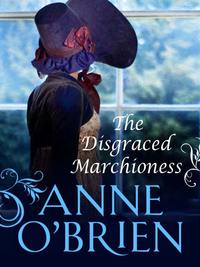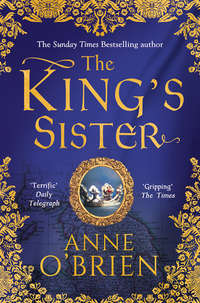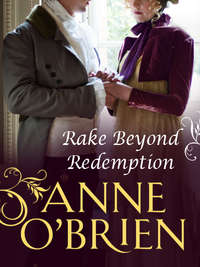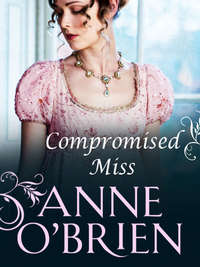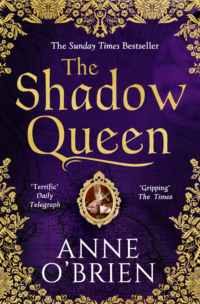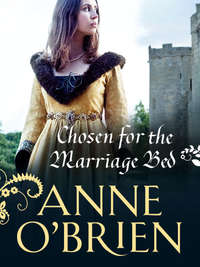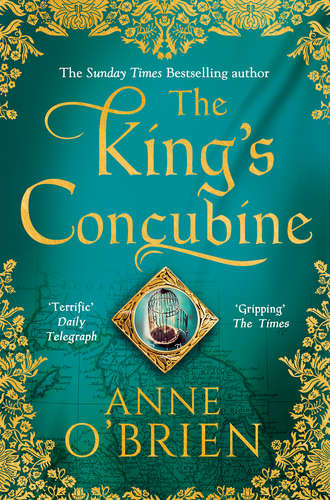
Полная версия
The King's Concubine
‘Why would she send me something so precious?’ I held the rosary up so that the sun caught the beads, turning them into a rainbow of iridescence.
My companion surveyed me from my cloth-bound hair to my mud-smeared hem as if it was far beyond his comprehension. ‘I really have no idea.’
Neither had I.
Chapter Four
Havering-atte-Bower
I KNEW nothing of royal palaces in those days when I arrived in Wykeham’s dusty wake. Neither was the grandeur of the place my first priority. Every one of my muscles groaned at its ill usage. We could not come to a halt fast enough for me; all I wanted was to slide down from that lumbering creature and set my feet on solid ground. But once in the courtyard at Havering I simply sat and stared.
‘Are you going to dismount today, mistress?’ Wykeham asked brusquely. He was already dismounted and halfway up the steps to the huge iron-studded door.
‘I’ve never seen …’ He wasn’t listening so I closed my mouth.
I have never seen anything so magnificent.
And yet it was strangely welcoming, with a seductive charm that St Mary’s with its grey stone austerity lacked. It seemed vast to me yet I was to learn that for a royal palace it was small and intimate. The stonework of the building glowed in the afternoon sunshine, a haphazard arrangement of rooms and apartments, the arches of a chapel to the right, the bulk of the original Great Hall to my left, then further outbuildings, sprawling outwards from the courtyard. Roofs and walls jutted at strange angles as the whim had taken the builders over the years. And if that was not enough, the whole palace was hemmed about by pasture and lightly wooded stretches, like a length of green velvet wrapped round a precious jewel.
It filled me with awe.
‘It’s beautiful!’
My voice must have carried. ‘It’ll do, for now,’ Wykeham growled. ‘The King’s grandfather built it—the first Edward. The Queen likes it—that’s the main thing—it’s her manor. It will be better when I’ve had my hands on it. I’ve a mind to put in new kitchens now that the King has his household here too.’ He fisted his hands on his hips. ‘For God’s sake, woman. Get off that animal.’
I slid down from the rump, staggering when my feet hit the ground, grateful when Wykeham strode forward to grip my arm.
‘Thank you, sir.’ I held on tight for a moment as my muscles quivered in protest.
‘I am at your disposal,’ he replied wryly. ‘Tell me when you can stand without falling over.’
Wykeham led the way up the shallow flight of steps, pushing open the door and stepping into the Great Hall. It was an echoing space, tables and trestles cleared away for the day except for the solid board on the dais at the far end. Cool after the heat of the sun, it was pleasant just to be there, the rafters above my head merging into deep shadows striped with soft bars of sunlight. Like the coat of a tabby cat. Servants moved quietly, replacing the wall sconces. A burst of laughter came from behind the screens at the far end that closed off the entrance to the kitchens. The tapestries on the walls glowed with rich colour, mirrored in the tiling beneath my feet.
I looked round in stark admiration. Was this where the Countess of Kent lived, that arrogant being who had left such an indelible impression on my younger self? I glanced at the shadows as if I might see her, watching me, judging me, before I chided myself for my foolishness. If the Countess had fulfilled her ambitions, she would be seated in the opulent splendour of the Queen’s private apartments, sipping wine, while a servant brushed her magnificent hair. If the serving woman’s comb happened to catch and drag on a tangle, the Countess would slap her without compunction.
A movement caught my interest. A maidservant crossed the room, busy with a tray of cups and a flagon, with a brief curtsey in Wykeham’s direction. My eye followed her. Was this, then, to be my destiny? To work in the kitchens of the royal palace? But why? Did the Queen not have enough servants? If she needed more, would her steward not find enough willing girls from the neighbouring villages? I could not see why she would bring me all the way from the Abbey to be a serving wench. Perhaps she needed a tirewoman, one who could read and write, but I hardly had the breeding for it. So why, in the name of the Blessed Virgin, was I here? The Queen would hardly stand in need of my meagre talents.
‘This way.’ Wykeham was striding ahead.
Behind us in the doorway a commotion erupted. Wykeham and I, and everyone in the Hall, turned to look. A man had entered to stand under the door arch. He was silhouetted by the low rays of the afternoon sun so that it was impossible to see his features, only his stature and bearing. Tall, with the build of a soldier, a man of action. Around his feet pushed and jostled a parcel of hounds and alaunts. On his gauntleted wrist rode a hooded goshawk. As the hawk shook its pinions, the man moved forward a step, into a direct sunbeam, so that he gleamed with a corona of light around head and shoulders, like one of the saints in the glazed windows of the Abbey. Crowned with gold.
Then, with another step, the moment passed. He was enclosed in soft shadow, an ordinary man again. And I was distracted when the hounds bounded forward, circling the Hall, sniffing at my skirts. Having no knowledge of such boisterous animals, I stepped back, wary of slavering mouths and formidable bodies. Wykeham bowed whilst I was engaged in pushing aside an inquisitive alaunt.
Wykeham cleared his throat.
‘What is it?’ I asked.
In reply Wykeham took hold of the ancient cloak that still enveloped me from chin to toe and twitched it off, letting it fall to the floor. I stiffened at this presumptuous action, took breath to remonstrate, when a voice, a strikingly beautiful voice, cut across the width of the Hall.
‘Wykeham, by God! Where’ve you been? Why are you always impossible to find, man?’
It was a clear-timbred voice, filling the space from walls to rafters. And striding toward us was the owner. The man with the raptor.
Wykeham bowed again, with what could have been construed as a scowl in my direction, so I curtseyed. The newcomer looked to me like a huntsman strayed into the Hall after a day’s exercise, looking to find a cup of ale or a heel of bread as he covered the ground with long loping strides, as lithe as the hound at his side.
And then he was standing within a few feet of me.
‘Sire!’ Wykeham bowed once more.
The King!
I sank to the floor, holding my skirts, my flushed face hidden. How naive I was. But how was I to know? He did not dress like a king. Then I looked up and saw him not a score of feet distant, and knew that he did not need clothing and jewels to proclaim his superiority. What a miraculous, god-like figure he was. A man of some age and experience, but he wore the years lightly. Handsome without doubt with a broad brow and a fine blade of a nose complemented by luxurious flaxen hair that shone as bright as silver. Here was no dry-as-dust dullard. The King shone like a diamond amongst worthless dross.
‘It’s the water supply!’ the King announced.
‘Yes, Sire. I have it in hand,’ Wykeham replied calmly.
‘The Queen needs heated water.’
The King’s complexion might once have been fair but his skin was tanned and seamed from an outdoor life in sun and cold. What a remarkable face he was blessed with, with blue eyes as keen as those of the raptor on his fist, whose hood he was in the process of removing. And what fluidity and grace there was about his movements as he unclipped his cloak, one-handed, swung it from his shoulder and threw it to a page who had followed him across the Hall. How had I not known that this was King Edward? At his belt was a knife in a jewelled scabbard, in his hat a ruby brooch pinning a peacock feather into jaunty place. Even without the glitter of gems, I should have known. He had a presence, the habit of command, of demanding unquestioning obedience.
So this was Queen Philippa’s magnificent husband. I was dazzled.
I stood, my heart beating fast, aware of nothing but my own unfortunate apparel, the heap of the disreputable mantle at my feet. But the King was not looking at me. Was I not more poorly clad than any of the servants I had seen in the palace? He would think—if he thought at all—that I was a beggar come to receive alms from the palace kitchens. Even the raptor eyed me as if I might be vermin and worth the eating.
The King swept his arm out in a grand gesture. ‘Out! All of you!’ The dogs obediently vanished through the door in a rush of excitement. ‘Will—I’ve been looking at the site for the bath house you proposed.’ He was close enough to clip Wykeham in an affectionate manner on his shoulder. ‘Where’ve you been?’
I might as well not have been there.
‘I’ve been to St Mary’s at Barking, Sire.’ Wykeham smiled.
‘Barking? Why in God’s name?’
‘Business for the Queen, Sire. A new chantry for the two dead Princesses.’
The King nodded. ‘Yes, yes. I’d forgotten. It gives her comfort and—before God!—precious little does.’ And at last he cast a cursory eye over me. ‘WhO’s this? Someone I employ?’ Removing the beaver hat with its brooch and feather, he inclined his head with grave courtesy, even though he thought I was a serving wench. His gaze travelled over my face in a cursory manner. I made another belated curtsey. The King tilted his chin at Wykeham, having made some judgement on me. ‘St Mary’s, you said. Have you helped one of the sisters to escape, Will?’
Wykeham smiled dryly. ‘The Queen sent for her.’
Those sharp blue eyes returned. ‘One of her waifs and strays perhaps. To be rescued for her own good. What’s your name, girl?’
‘Alice, Sire.’
‘Glad to escape?’
‘Yes, Sire.’ It was heartfelt, and must have sounded it.
And Edward laughed, a sound of great joy that made me smile too. ‘So would I be. Serving God’s all very well, but not every hour of every day. Do you have talents?’ He frowned at me as if he could not imagine it. ‘Play a lute?’ I shook my head. ‘Sing? My wife likes music.’
‘No, Sire.’
‘Well, I suppose she has her reasons.’ He was already losing interest, turning away. ‘And if it makes her happy … Come here!’
I started, thinking that he meant me, but he clicked his fingers at a rangy alaunt that had slunk back into the Hall and was following some scent along the edge of a tapestry. It obeyed to fawn and rub against him as he twisted his fingers into its collar. ‘Tell Her Majesty, Will—No, on second thoughts, you come with me. You’ve completed your task for the Queen. I’ve demands on your time for my new bath house.’ He raised his voice. ‘Joscelyn! Joscelyn!’
A man approached from where he had been waiting discreetly beside the screen.
‘Yes, Sire.’
‘Take this girl to the Queen. She has sent for her. Now, Will …’ They were already knee-deep in planning. ‘I think there’s the perfect site. Let me get rid of these dogs and birds …’ Whistling softly to the raptor on his wrist, the King headed to the door. Wykeham followed. They left me without a second look. Why would they not?
Sir Joscelyn, who I was to learn was the royal steward, beckoned me to follow him but I hesitated and looked back over my shoulder. Wykeham was nodding, my last view of him gesturing with his hands as if describing the size and extent of the building he envisaged. They laughed together, the King’s strong voice overlaying Wykeham’s softer responses. And then he was gone with the King, as if my last friend on earth had deserted me. My only friend. And, of course, he wasn’t, but who else did I know here? I would not forget his brusque kindness. As for the King, I had expected a crown or at least a chain of office. Not a pack of dogs and a hawk. But there was no denying the sovereignty that sat as lightly on his shoulders as a summer mantle.
‘Come on, girl. I haven’t got all day.’
I sighed and followed the steward to discover what would become of me as one of the Queen’s habitual waifs and strays. I stuffed the rosary that I still clutched into the bosom of my overgown and followed as I had been bidden.
The Queen’s apartments were silent. Finding no one in any of the antechambers to whom he could hand me over, Sir Joscelyn rapped on a door, was bidden to enter and did so, drawing me with him. I found myself on the threshold of a large sun-filled room so full of colour and activity and soft chatter, of feminine glamour, that it filled my whole vision, more than even the grandeur of the Great Hall. Here was every hue and tint I could imagine, creating butterflies of the women who inhabited the room. Ill-mannered certainly, but I stared at so beguiling a scene. There they were, chattering as they stitched, books and games to hand for those who wished, not an enshrouding wimple or brow-hugging veil amongst them. A whole world of which I had no knowledge to enchant ear and eye. The ladies talked and laughed; someone was singing to the clear notes of a lute. There was no silence here.
I could not see the Queen in their midst. Neither, to my relief, could I see the Countess of Kent.
The steward cast an eye and discovered the face he sought.
‘My lady.’ His bow was perfection. Learning fast, I curtseyed. ‘I would speak with Her Majesty.’
Princess Isabella looked up from the lute she was playing but her fingers continued to strum idly over the strings. Now I knew the source of her beautiful fairness: she was her father’s daughter in height and colouring.
‘Her Majesty is indisposed, Joscelyn. Can it wait?’
‘I was commanded to bring this person to Her Majesty.’ He nudged me forward with haughty condescension. I curtseyed again.
‘Why?’ Her gaze remained on the lute strings. She was not the King’s daughter in kindness.
‘Wykeham brought her, my lady.’
The Princess’s eye lifted to take in my person. ‘Who are you?’
‘Alice, my lady.’ There was no welcome here. Not even a memory of who I was. ‘From St Mary’s Abbey at Barking, my lady.’
A line dug between Isabella’s brows, then smoothed. ‘I remember. The girl with the rosary—the one who worked in the kitchens or some such.’
‘Yes, my lady.’
‘Her Majesty sent for you?’ Her fingers strummed over the lute strings again and her foot tapped impatiently. ‘I suppose I must do something with you.’ The glint in her eye, I decided, was not friendly.
One of the ladies approached to put her hand on the Princess’s shoulder with the confidence of long acquaintance. ‘Play for us, Isabella. We have a new song.’
‘With pleasure. Take the girl to the kitchens, Joscelyn. Give her a bed and some food. Then put her to work. I expect that’s what Her Majesty intended.’
‘Yes, my lady.’
Isabella had already given her attention to the ladies and their new song. The steward bowed himself out, pushing me before him, the door closing on that magical scene. I had not managed to step beyond the threshold, and I was shaken by a desire to do so, to be part of the life that went on behind that closed door.
Sir Joscelyn strode off without a word, expecting me to follow, as I did. I should be grateful that I was being given food and a place to sleep. Would life as a kitchen wench at Havering-atte-Bower be better or worse than as a conversa in the Abbey at Barking? Would it be better than life as a drudge in the Perrers household?’ I was about to find out, thanks to the effortless malice of Princess Isabella, for I knew, beyond doubt, that the Queen had not brought me all the way from Barking to pluck chickens in her kitchens. It was all Isabella’s fault. I knew an enemy when I saw one.
‘This girl, Master Humphrey …’ The steward’s expression spoke his contempt. ‘Another of Her Majesty’s gutter sweepings to live off our charity.’
A grunt was all the reply he got. Master Humphrey was wielding a cleaver on the carcass of a pig, splitting it down the backbone with much-practised skill.
‘The Lady said to bring her to you.’
The cook stopped, in mid-chop, and looked up under grizzled brows. ‘And what, may I ask, do I do with her?’
‘Feed her. Give her a bed. Clothe her and put her to work.’
‘Ha! Look around you, Jos! What do you see?’
I looked also. The kitchen was awash with activity: on all sides scullions, spit boys, pot boys, bottle washers applied themselves with a racket as if all hell had broken loose. The heat was overpowering from the ovens and open fires. I could already feel sweat beginning to trickle down my spine and dampen my hair beneath my hood.
‘What?’ Sir Joscelyn growled. I thought he did not approve of the liberty taken with his name.
‘I don’t employ girls, Jos. They’re not strong enough. Good enough for the dairy and serving the dishes—but not here.’ The cook emphasised the final word with a downward sweep of his axe.
‘Well, you do now. Princess Isabella’s orders. Kitchens, she said.’
Another grunt. ‘And what the Lady wants …!’
‘Exactly.’
Sir Joscelyn duly abandoned me in the midst of the teaming life of Havering’s kitchens. I recognised the activities—the cleaning, the scouring, the chopping and stirring—but my experience was a pale shadow to them. The noise was ear-shattering. Exhilarating. Shouts and laughter, hoots of ridicule, bellowed orders, followed inevitably by oaths and complaints. There seemed to be little respect from the kitchen lads, but the cook’s orders were carried out with a promptness that suggested a heavy hand if they transgressed them. And the food. My belly rumbled at the sight of it. As for the scents of roasting meat, of succulent joints …
‘Don’t stand there like a bolt of cloth.’
The cook, throwing down his axe with a clatter, gave me no more than a passing look, but the scullions did, with insolent grins and earthy gestures. I might not have much experience of such signs with tongues and fingers—except occasionally in the market between a whore and a dissatisfied customer—but it did not take much imagination. They made my cheeks glow with a heat that was not from the fire.
‘Sit there.’ Master Humphrey pressed down on my shoulder with a giant hand, and so I did at the centre board, sharing it with the pig. A bowl of thick stew was dumped unceremoniously in front of me, a spoon pushed into my hand and a piece of stale wastel bread thrown down on the table within reach.
‘Eat, then—and fast. There’s work to be done.’
I ate, without stopping. I drank a cup of ale handed to me. I had not realised how hungry I was.
‘Put this on.’
A large apron of stained linen was held out by Master Humphrey as he carried a tray of round loaves to thrust into one of the two ovens. It was intended for someone much larger, and I hitched it round my waist or I would have tripped on it. I was knotting the strings, cursing Isabella silently under my breath, when the cook returned.
‘Now! Let me look at you!’ I stood before him. ‘What did you say your name was?’
‘Alice.’
‘Well, then, Alice, no need to keep your eyes on your feet here or you’ll fall on your arse.’ His expression was jaundiced. ‘You’re not very big.’
‘She’s big enough for what I’ve in mind!’ shouted one of the scullions, a large lad with tow hair. A guffaw of crude laughter.
‘Shut it, Sim. And keep your hands to yourself or …’ Master Humphrey seized and wielded his meat cleaver with quick chopping movements. ‘Pay them no heed.’ He took my hands in his, turned them over. ‘Hmm. What can you do?’
I did not think it mattered what I said, given the continuing obscenities from the two lads struggling to manhandle a side of venison onto a spit. I would be given the lowliest of tasks. I would be a butt of jokes and innuendo.
‘Come on, girl! I’ve never yet met a woman with nothing to say for herself!’
So far I had been moved about like the bolt of cloth he had called me, but if this was to be my future I would not sink into invisibility. With Signora Damiata I had controlled my manner because to do otherwise would have called down retribution. Here I knew that I must stand up for myself and demand some respect.
‘I can do that, Master Humphrey. And that.’ I pointed at the washing and scouring going on in a tub of water. ‘I can do that.’ A small lad was piling logs on the fire.
‘So could an imbecile!’ The cook aimed a kick at the lad at the fire, who grinned back.
‘I can make bread. I can kill those.’ Chickens clucking unsuspectingly in an osier basket by the hearth. ‘I can do that.’ I pointed to an older man who was gutting a fish, scooping the innards into a basin with the flat of his hand. ‘I can make a tincture to cure a cough. And I can make a—’
‘My, my. What an addition to my kitchen.’ Master Humphrey gripped his belt and made a mocking little bow. He did not believe half of what I said.
‘I can keep an inventory of your food stuffs.’ I was not going to shut up unless he ordered me to. ‘I can tally your books and accounts.’ If I was condemned to work here, I would make a place for myself. Until better times.
‘A miracle, by the Holy Virgin.’ The mockery went up by a notch. ‘What is such a gifted mistress of all crafts doing in my kitchen?’ The laughter at my expense expanded too. ‘Let’s start with this for now.’
I was put to work raking the hot ashes from the ovens and scouring the fat-encrusted baking trays. No different from the Abbey or the Perrers’s household at all.
But it was different, and I relished it. Here was life at its most coarse and vivid, not a mean existence ruled by silence and obedience. This was no living death. Not that I enjoyed the work—it was hard and relentless and punishing under the eye of Master Humphrey and Sir Joscelyn—but here was no dour disapproval or use of a switch if I sullied the Rule of Saint Benedict. Or caught Damiata’s caustic eye. Everyone had something to say about every event or rumour that touched on Master Humphrey’s kitchen. I swear he could discuss the state of the realm as well as any great lord while slitting the gizzard of a peacock. It was a different world. I was now the owner of a straw pallet in a cramped attic room with two of the maids who strained the milk and made the rounds of cheese in the dairy. I was given a blanket, a new shift and kirtle—new to me at any event—a length of cloth to wrap round my hair and a pair of rough shoes.
Better than a lay sister at St Mary’s? By the Virgin, it was!
I listened as I toiled. The scullions gossiped from morn till night, covering the whole range of the royal family. The Queen was ill, the King protective. The King was well past the days of his much-lauded victory on the battlefield of Crécy against the bloody French, but still a man to be admired. Whilst Isabella, a madam, refusing every sensible marriage put to her. The King should have taken a whip to her sides! As for the Countess of Kent—my ears instantly pricked up—who had married the Prince and would one day be Queen, well, she was little better than a whore, and an ill-mannered one at that when it suited her. Thank God she was in Aquitaine with her long-suffering husband. Unaware of my interest, the scurrilous gossip continued.
Gascony and Aquitaine, our possessions across the channel, were in revolt. Ireland was simmering like a pot of soup. Now the buildings of the man Wykeham! Water directed to the kitchens to run direct from a spigot into a bowl at Westminster! May it come to Havering soon, pray God.
Meanwhile I was sent to haul water from the well twenty times a day. Master Humphrey had no need for me to read or tally. I swept and scoured and chopped, burned my hands, singed my hair and emptied chamber pots. I lifted and carried and swept up. And I worked even harder to keep the lascivious scullions and pot boys at a distance. I learned fast. By God, I did!
Sim. The biggest lout of them all with his fair hair and leering smile.
I did not need any warning. I had seen Sim’s version of romantic seduction when he trapped one of the serving wenches against the door of the woodstore. It had not been enjoyment on her face as he had grunted and laboured, his hose around his ankles. I did not want his greasy hands with their filthy nails on me. Or any other part of his body. The stamp of a foot on an unprotected instep, a sharp elbow to a gut kept the human vermin at bay for the most part. Unfortunately it was easy for Sim and his crowd to stalk me in the pantry or the cellar. If his arm clipped my waist once, it did so a dozen times within the first week.


